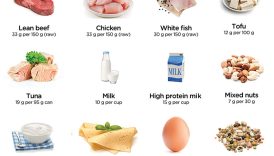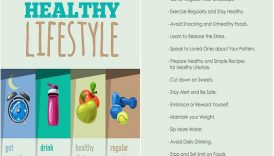Effortless Ways to Incorporate Health into Your Daily Routine

In today’s fast-paced world, prioritizing health has become more crucial than ever. With a multitude of responsibilities piling up, many individuals often find themselves neglecting their well-being. However, taking the time to address health doesn’t have to be overwhelming.
- Effortless Ways to Incorporate Health into Your Daily Routine
- The Importance of Health
- Benefits of Prioritizing Health
- Improved Physical Health
- Enhanced Mental Well-being
- Setting Realistic Health Goals
- Short-term Goals
- Long-term Goals
- Healthy Eating Habits
- Balanced Diet
- Meal Prepping Tips
- Staying Active Throughout the Day
- Exercise Breaks
- Desk-friendly Workouts
- Importance of Hydration
- Benefits of Drinking Water
- Hydration Reminders
- Quality Sleep for Overall Health
- Sleep Hygiene Practices
- Creating a Restful Environment
- Stress Management Techniques
- Mindfulness Meditation
- Breathing Exercises
- Social Connections and Health
- Building Supportive Relationships
- Importance of Community Engagement
- Quick and Easy Healthy Recipes
- Snack Ideas
- Meal Replacement Options
The Importance of Health
Just as we invest time and energy into our careers and relationships, we must also dedicate resources to our physical and mental health. A personal journey can often shed light on this necessity. For instance, after experiencing burnout from a hectic work schedule, one individual decided to set health as a priority. By implementing small changes, like better eating and regular physical activity, they not only improved their mood but also gained more energy for their daily tasks.
- Key Areas to Focus On:
- Physical health
- Mental well-being
- Nutrition
- Physical activity
Prioritizing health is not merely a checkbox on a to-do list; it is an ongoing commitment to oneself that reaps numerous benefits, enhancing overall quality of life. Let’s explore why this commitment pays off in the following sections.
Benefits of Prioritizing Health
Having established the significance of putting health first, let’s delve into the myriad benefits that come from this commitment. Prioritizing health leads to tangible improvements across various aspects of life.
Improved Physical Health
When individuals embrace healthy habits, they often notice substantial changes in their physical health. Simple actions like regular exercise, balanced nutrition, and adequate rest can contribute to:
- Increased Energy Levels: Regular workouts boost stamina and vitality.
- Weight Management: Healthy eating and exercise play a vital role in maintaining a healthy weight.
- Disease Prevention: A proactive approach can lower the risk of chronic illnesses like diabetes and heart disease.
Take the example of a person who started jogging three times a week. Within months, they experienced significant weight loss and greater endurance, allowing them to engage more fully in daily activities.
Enhanced Mental Well-being
Beyond physical benefits, prioritizing health also nurtures mental well-being. Healthy lifestyle choices can lead to:
- Reduced Stress Levels: Engaging in physical activities can alleviate stress and anxiety.
- Improved Mood: A balanced diet and regular exercise release endorphins, contributing to a happier outlook.
- Better Focus and Productivity: A healthy body can lead to a clearer mind, enhancing overall productivity both at work and home.
Consider someone who, after committing to mindfulness practices and regular exercise, found their productivity soaring at work, and their evenings became more enjoyable. By prioritizing health, they enriched their life both personally and professionally.
Setting Realistic Health Goals
With a clear understanding of the benefits of prioritizing health, the next step is to establish realistic goals that lead to long-term success. Setting both short-term and long-term health goals can provide direction and motivation on your journey.
Short-term Goals
Short-term goals are often more achievable and can quickly boost confidence. These goals typically span weeks to a few months and can include:
- Daily Exercise Targets: Aim for 30 minutes of physical activity, five days a week.
- Healthy Eating Challenges: Commit to cooking at home five evenings a week instead of ordering takeout.
- Hydration Targets: Drink eight glasses of water daily for a week.
For example, a person might set a short-term goal to walk 10,000 steps each day. Achieving this target not only enhances their physical activity but also fosters a sense of accomplishment.
Long-term Goals
Long-term goals provide a broader perspective and can span several months to years. They are crucial for sustained health improvements and may include:
- Weight Loss Objectives: Aim to lose a specific amount of weight over six months.
- Fitness Milestones: Train for a 5K or half-marathon scheduled several months ahead.
- Nutritional Changes: Gradually transition to a plant-based diet over the course of a year.
By setting a long-term goal to run a half-marathon, an individual can break that down into smaller milestones, such as increasing their running distance incrementally. This holistic approach keeps their motivation high and ensures steady progress, blending short-term wins with enduring transformations.
Healthy Eating Habits
Now that you have set realistic health goals, it’s time to focus on healthy eating habits. Adopting a balanced diet and learning meal prepping strategies can make a significant difference in achieving your health aspirations.
Balanced Diet
A balanced diet is essential for providing the nutrients your body needs to function optimally. This includes a variety of food groups that support both physical and mental health. Key components of a balanced diet include:
- Fruits and Vegetables: Aim for at least five servings a day. These are high in vitamins, minerals, and antioxidants.
- Whole Grains: Choose whole grains over refined grains for added fiber and nutrients.
- Proteins: Incorporate lean proteins such as chicken, fish, beans, and legumes into your meals.
- Healthy Fats: Include sources like avocados, nuts, and olive oil, which support heart health.
For instance, a busy professional might find joy in creating vibrant salads packed with seasonal vegetables as a quick lunch option.
Meal Prepping Tips
Meal prepping can simplify healthy eating and save time during the week. Here are some effective tips:
- Plan Your Weekly Menu: Designate a day to plan meals for the upcoming week. Write down breakfast, lunch, and dinner options.
- Batch Cook: Prepare larger portions of grains, proteins, and vegetables to mix and match throughout the week.
- Use Containers: Invest in good-quality storage containers that are portioned for easy grab-and-go meals.
- Involve the Family: Get everyone in on the meal prep process. This can turn cooking into a fun family activity.
By dedicating a few hours on weekends to meal prep, one individual found they saved time during busy weekdays while still enjoying nutritious meals. Embracing a balanced diet and meal prepping not only fosters healthier eating habits but also encourages a more organized lifestyle.
Staying Active Throughout the Day
With healthy eating habits in place, the next essential component of a balanced lifestyle is staying active throughout the day. Incorporating regular movement into daily routines significantly boosts overall health and well-being.
Exercise Breaks
One effective way to counteract a sedentary lifestyle is to take exercise breaks. Not only do these breaks refresh your mind, but they also help stretch tired muscles. Here are some simple ideas:
- Set a Timer: Every hour, take a five-minute break to stand up, stretch, or take a brisk walk around the office.
- Mini Workouts: Incorporate short bursts of activity, such as jumping jacks or squats, during these breaks.
- Walk-and-Talk Meetings: Suggest walking meetings instead of sitting in a conference room.
For instance, after experiencing fatigue from long hours at the desk, one individual noticed more energy and focus after incorporating five-minute walks every hour.
Desk-friendly Workouts
If you’re short on time or limited in space, desk-friendly workouts can be a lifesaver. Here are some quick exercises you can do right at your desk:
- Chair Squats: Stand up and lower yourself back down as if you’re sitting back into your chair, repeating 10-15 times.
- Desk Push-ups: Lean against your desk and perform push-ups, using the edge of the desk for support.
- Seated Leg Raises: While seated, extend one leg out straight, hold for a moment, and then lower it back down. Repeat on both legs.
These small movements can keep your blood circulating and energize you throughout the day. Embracing these practical strategies allows individuals to incorporate fitness seamlessly into their busy schedules, thus enhancing their overall health and productivity.
Importance of Hydration
Having explored ways to stay active throughout the day, it’s crucial to address another key aspect of health: hydration. Staying properly hydrated is vital for maintaining both physical and mental performance.
Benefits of Drinking Water
Drinking enough water offers numerous benefits that can enhance overall health. Some of the standout advantages include:
- Boosts Energy Levels: Dehydration can lead to fatigue. Staying hydrated keeps energy levels stable.
- Improves Digestion: Water aids in breaking down food and can help prevent constipation.
- Enhances Focus: Proper hydration can improve concentration and alertness, making tasks easier to accomplish.
- Supports Skin Health: Regular intake of water can lead to healthier, more radiant skin.
For example, after someone committed to drinking more water each day, they noticed not only improved skin but also sharper focus at work—turning mundane tasks into achievable goals.
Hydration Reminders
Staying hydrated is vital, but it can be easy to forget amidst a busy schedule. Here are some practical hydration reminders:
- Use a Water Bottle: Carrying a reusable water bottle can serve as a constant reminder.
- Set Alarms: Schedule reminders on your phone to drink water every hour.
- Infuse Your Water: Add slices of fruits or herbs (like lemon, mint, or cucumber) to make drinking water more enjoyable.
- Track Your Intake: Use apps or journals to keep track of how much water you drink daily.
By integrating these strategies, individuals can effortlessly prioritize hydration, leading to a healthier, more energized life. Staying mindful about water intake not only benefits personal well-being but allows for greater productivity in daily tasks.
Quality Sleep for Overall Health
With hydration well managed, another cornerstone of overall health is quality sleep. Sleep plays a critical role in physical recovery, mental clarity, and emotional balance. Improving sleep quality can have widespread benefits in everyday life.
Sleep Hygiene Practices
Implementing good sleep hygiene practices can significantly enhance sleep quality. Here are some effective strategies to consider:
- Consistent Sleep Schedule: Go to bed and wake up at the same time every day, even on weekends, to regulate your body clock.
- Limit Screen Time: Try to avoid screens at least an hour before bedtime, as blue light can disrupt melatonin production.
- Relaxing Pre-sleep Rituals: Engage in calming activities like reading, meditating, or gentle stretching to signal to your body that it’s time to wind down.
For example, after a hectic week, one person adopted a consistent sleep routine and found themselves feeling more refreshed and productive in the morning.
Creating a Restful Environment
A conducive sleep environment is essential for achieving quality rest. Here are some tips to optimize your sleeping space:
- Comfortable Bedding: Invest in a good quality mattress and pillows that provide adequate support.
- Control Light and Noise: Use blackout curtains and consider white noise machines or earplugs to minimize disruptions.
- Maintain a Cool Temperature: A slightly cooler room (around 60-67°F or 15-19°C) can promote better sleep.
By turning their bedroom into a sanctuary of peace, an individual discovered that not only did they fall asleep faster, but they also woke up feeling more rejuvenated. Adopting proper sleep hygiene practices and optimizing the sleep environment can profoundly impact overall health, productivity, and well-being.
Stress Management Techniques
Having established the importance of quality sleep, it’s vital to address another significant aspect of health: stress management. Effective stress management techniques can greatly improve emotional well-being and overall health.
Mindfulness Meditation
Mindfulness meditation is a powerful tool for reducing stress. It involves focusing your attention on the present moment, which can help clear mental clutter. Here are some tips for getting started:
- Start Small: Begin with just five minutes a day, gradually increasing as you become more comfortable.
- Find a Quiet Space: Choose a serene environment where you won’t be disturbed.
- Focus on Your Breath: Pay attention to your inhalations and exhalations, observing any thoughts that arise without judgment.
One individual, after incorporating mindfulness meditation into their daily routine, found that it significantly reduced their anxiety levels, allowing them to approach daily challenges with a calmer mindset.
Breathing Exercises
Another effective stress management technique is practicing breathing exercises. Deep, intentional breathing can activate the body’s relaxation response. Consider the following methods:
- 4-7-8 Breathing: Inhale for 4 seconds, hold for 7 seconds, and exhale for 8 seconds. Repeat this cycle four times.
- Diaphragmatic Breathing: Place one hand on your chest and the other on your abdomen. Breathe deeply through your nose, allowing your stomach to rise while keeping your chest relatively still.
After taking just a few moments for breathing exercises, many people report feeling grounded and more focused, even amidst hectic schedules. By incorporating mindfulness meditation and breathing techniques into daily life, individuals can effectively manage stress, leading to enhanced emotional resilience and overall health.
Social Connections and Health
Having addressed effective stress management techniques, it’s essential to recognize the role of social connections in overall health. Strong social relationships can significantly impact emotional well-being and longevity.
Building Supportive Relationships
Fostering supportive relationships is crucial for maintaining mental health. Meaningful connections provide a safety net during life’s ups and downs. Here are some tips to nurture these connections:
- Regular Check-ins: Make it a habit to catch up with friends or family members through calls or messages.
- Quality Time: Schedule dedicated time for activities together, whether it’s a coffee date or a virtual game night.
- Open Communication: Be honest and open about your feelings. Sharing experiences can deepen bonds.
One individual, after prioritizing time with friends, discovered that they felt less isolated and stressed, boosting their overall mood and outlook on life.
Importance of Community Engagement
In addition to personal relationships, engaging with your community can enhance well-being. Being part of a community fosters a sense of belonging. Consider these strategies for active participation:
- Volunteer: Offer your time to local organizations or causes that resonate with you.
- Join Groups or Clubs: Participate in activities that align with your interests, such as book clubs, sports teams, or art classes.
- Attend Local Events: Making an effort to attend community events can introduce you to new connections and experiences.
Engaging in a community not only enriches one’s life but also contributes to feelings of fulfillment and joy. One person found that volunteering not only improved their mood but also allowed them to forge new friendships. By prioritizing social connections and community engagement, individuals can significantly enhance their mental health and overall quality of life.
Quick and Easy Healthy Recipes
With a strong foundation in social connections and community engagement, let’s explore quick and easy healthy recipes that can effortlessly fit into a busy lifestyle. Nutritional meals and snacks can be simple and delicious!
Snack Ideas
Healthy snacks can curb hunger and provide an energy boost throughout the day. Here are a few easy ideas:
- Greek Yogurt with Berries: Top a bowl of Greek yogurt with fresh berries and a drizzle of honey for a delicious and protein-packed snack.
- Hummus and Veggies: Pair homemade or store-bought hummus with sliced carrots, cucumbers, and bell peppers for a crunchy, satisfying treat.
- Nut Butter Apple Slices: Spread almond or peanut butter on apple slices for a sweet yet nutritious snack that satisfies cravings.
A busy professional once adopted these snack ideas and found they not only improved their energy levels but also enhanced their focus during afternoon work slumps.
Meal Replacement Options
Sometimes, life gets hectic, and meal replacements can be a lifesaver. Here are quick and nutritious options:
- Smoothie Packs: Prepare freezer bags with fruits, spinach, and protein powder. When ready to eat, blend with your choice of nut milk or yogurt.
- Overnight Oats: Combine oats, chia seeds, yogurt, and your favorite fruits in a jar. Let it sit overnight for a quick breakfast.
- Whole Grain Wraps: Fill whole grain wraps with lean proteins like turkey or chicken, mixed greens, and a spread of hummus for a balanced meal on the go.
Incorporating meal replacements, one individual managed to maintain a healthy diet even during their busiest days. These quick recipes not only foster healthy eating habits but also help streamline meal planning, making nutrition achievable for everyone.





